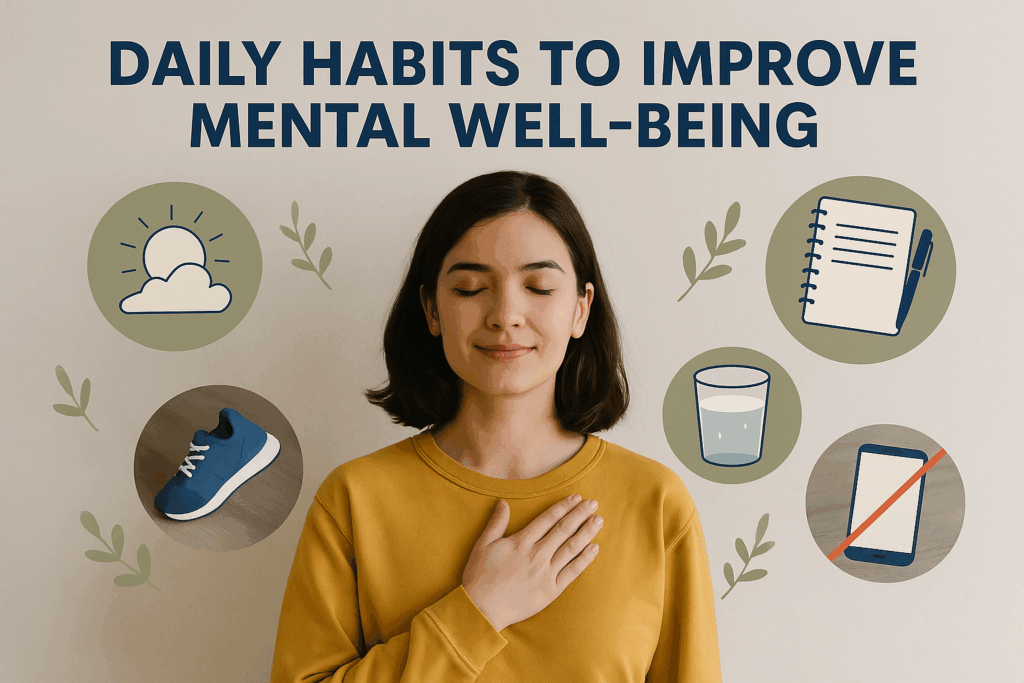Daily Habits to Improve Mental Well-Being
Modern life often challenges our mental balance. Fortunately, adopting daily habits to improve mental well-being can make a significant difference in how we handle stress, emotions, and daily tasks. These consistent practices can rewire our brain, uplift our mood, and help us live with more purpose. In this article, we’ll explore science-backed daily routines that strengthen your mind and support emotional wellness.

Why Daily Habits to Improve Mental Well-Being Matter
Daily habits, while simple, are incredibly powerful. They form the foundation of how we think, feel, and react. In fact, daily habits to improve mental well-being have a cumulative impact: over time, they lead to better focus, greater emotional stability, and more resilience.
Moreover, repeating positive actions reduces decision fatigue. This means your brain spends less energy on choosing what to do and more energy on enjoying life. As a result, healthy habits become easier and more automatic, which encourages long-term success.
Morning Daily Habits to Improve Mental Well-Being
Begin with Gratitude and Clear Intentions
Starting the day with a grateful mindset can set a positive tone. Even though it may seem small, writing down just three things you’re thankful for shifts attention from stress to appreciation.
In addition, setting an intention like “I will remain calm today” gives your brain a helpful framework. Therefore, you’re more likely to stay centered, even in difficult situations.
Exposure to Natural Morning Light
As soon as you wake up, open the curtains or step outside for a few minutes. Morning sunlight supports the body’s circadian rhythm, which improves both sleep and emotional balance.
This habit also increases serotonin production, commonly known as the “feel-good hormone.” Consequently, you’ll feel more alert and mentally energized throughout the day.
Midday Practices That Support Mental Resilience
Movement as a Daily Habit to Improve Mental Well-Being
Regular physical activity is one of the most effective ways to care for your mind. Whether it’s walking, stretching, or dancing, movement boosts endorphins and improves concentration.
Even though time may be limited, just 10 minutes of light exercise can reduce anxiety. Moreover, it helps clear your thoughts and recharge your emotional batteries.
Breathing and Meditation Breaks
Mindful breathing is another excellent strategy. Try breathing in for 4 seconds, holding for 4, and exhaling slowly for 6. This pattern calms your nervous system.
Meditation, even in small doses, trains your brain to stay present. In addition, consistent practice reduces overthinking and enhances your overall sense of peace.
Nutrition: Fueling Daily Habits to Improve Mental Well-Being
Choose Brain-Boosting Foods
What you eat directly affects how you think and feel. Incorporating foods high in omega-3s, magnesium, and antioxidants helps balance your mood and reduce brain fog.
For instance, leafy greens, berries, and fatty fish all contribute to better focus and emotional stability. Therefore, a nourishing diet is essential for sustainable mental health.
Stay Hydrated to Maintain Focus
Hydration is often overlooked but crucial. Even mild dehydration can cause headaches, fatigue, and irritability. So, keeping a water bottle nearby is a simple but impactful habit.
In addition, herbal teas and water-rich fruits like watermelon and oranges support hydration while offering extra nutrients.
Creating Boundaries With Technology and Social Media
Daily Habits to Improve Mental Well-Being by Managing Screen Time
Too much screen exposure can trigger anxiety and disturb your sleep. Set limits, especially in the morning and before bed, to protect your mental space.
Instead of doomscrolling, try offline activities like reading or journaling. Moreover, digital breaks help you reconnect with your thoughts and emotions more clearly.
Choose Real Connection Over Digital Noise
While social media may seem convenient, real-life conversations are far more nourishing. Meeting with friends, even briefly, strengthens your emotional resilience.
Therefore, prioritize face-to-face interactions whenever possible. In contrast, relying only on virtual contact can increase feelings of loneliness.
Evening Daily Habits to Improve Mental Well-Being
Unplug and Wind Down Naturally
Your brain needs time to slow down. So, create a calming nighttime routine with activities like a warm shower, light stretching, or soft music.
As a result, you’ll fall asleep faster and experience deeper rest. In addition, avoiding screens before bed helps your brain produce melatonin naturally.
Reflect to Release Stress and Gain Clarity
Journaling at night allows you to process your emotions before sleep. Write about your thoughts, wins, or even worries.
Furthermore, this habit prevents mental clutter and helps you wake up feeling lighter. Even if you only write a few lines, the impact can be significant.
How to Stick to Daily Habits to Improve Mental Well-Being
Start Small and Build Consistency
If you try to change everything at once, you’re likely to feel overwhelmed. Instead, pick one or two habits and practice them regularly. For example, begin with a short walk after lunch or five minutes of stretching in the morning.
Even though the changes may seem tiny, consistency is what matters most. Over time, these small steps become lasting routines.
Track Progress and Stay Motivated
Use a habit tracker or calendar to mark your successes. This gives you a visual reminder of how far you’ve come. Moreover, celebrating small wins keeps your momentum alive.
As you notice improvements in mood and energy, you’ll be naturally motivated to keep going. Therefore, reinforcing the habit loop makes these practices part of your identity.
Building a Mindset for Long-Term Mental Wellness
Daily Habits to Improve Mental Well-Being Through Self-Compassion
Change takes time. Some days will feel easy, while others will feel hard. However, being kind to yourself during setbacks helps you stay committed.
In addition, self-compassion reduces guilt and perfectionism, two mental habits that often lead to burnout. Therefore, treat yourself with the same kindness you’d offer a friend.
Focus on Progress, Not Perfection
Mental wellness isn’t about having perfect days. Rather, it’s about choosing to do your best with what you have. Even when life gets busy, a few mindful moments can make a difference.
In contrast to quick fixes, sustainable habits grow stronger over time. Eventually, they become a natural part of your lifestyle.
Final Thoughts
Ultimately, it’s the small, intentional actions we repeat every day that shape our mental health. By integrating daily habits to improve mental well-being into your morning, afternoon, and evening routines, you’ll begin to feel more grounded, resilient, and emotionally aligned.
Remember, even though life can be unpredictable, your daily habits provide a reliable anchor. Therefore, begin where you are, take one step at a time, and trust that consistent effort leads to meaningful change.
